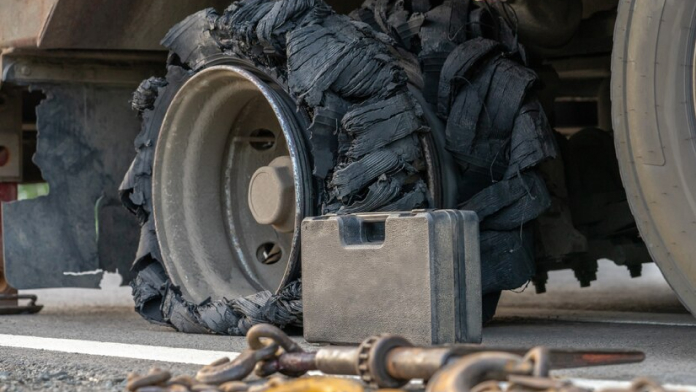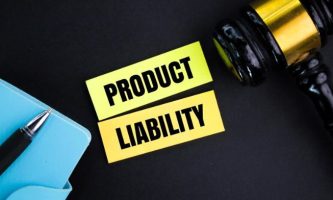Legal Recourse for Victims After a Truck Tire Blowout Accident

In the quiet expanse of a highway, a sudden explosion shatters the tranquility — the aftermath of a truck tire blowout. These incidents, more than mere accidents, carry devastating consequences.
Understanding negligence is crucial. It forms the backbone of seeking compensation for injuries caused by truck tire blowouts. From single tire blowouts to retread failures, the spectrum of accidents demands a comprehensive legal approach. In this article, we will be discussing the legal recourse one can take after being a victim in a truck tire blowout accident.
Understanding the Risks of Truck Tire Blowouts

The causes behind truck tire blowouts are varied yet often preventable. Underinflation, overloading, lack of maintenance, and worn-out treads lay the groundwork for these hazardous incidents. The potential dangers are multifaceted — from the loss of control and vehicle instability to the peril of debris scattered across the road. The risks escalate exponentially with the sheer size and weight of heavy trucks, amplifying the potential for catastrophic consequences.
Navigating these risks requires an understanding of the legal concept of negligence. This segues us into the crux of our exploration — proving negligence in the aftermath of a truck tire blowout accident.
Proving Negligence in Truck Tire Blowout Accident Claims
Negligence, a cornerstone of legal recourse, encompasses four essential elements: duty of care, breach of duty, causation, and damages. In the context of truck tire blowouts, the duty of care rests on the truck driver and the trucking company.
Their responsibility is clear — maintain vehicles diligently to avert blowouts and ensuing accidents.
To substantiate negligence claims, a diverse array of evidence comes into play. Maintenance records, inspection reports, eyewitness testimonies, photographs capturing the tire and resulting debris, and expert opinions create a mosaic that illustrates the circumstances leading to the accident. The complexities of these cases lie not just in the intricacies of the legal principles but in deciphering the intricacies of heavy truck systems and pinpointing contributing factors.
Multiple Potentially Liable Parties
The aftermath of a truck tire blowout prompts a critical question: who bears responsibility?
The answer often involves a web of potentially liable parties. Beyond the obvious scrutiny of the truck driver and the trucking company, the tire manufacturer might share culpability.
Additionally, maintenance companies overseeing negligent repairs could contribute to the incident.
Vicarious liability introduces another layer to the legal landscape. This concept holds employers responsible for the actions of their employees. In the realm of truck tire blowouts, this translates to the trucking company being accountable for the driver’s negligence. The potential for multiple entities to share liability adds complexity to these cases.
Moreover, in cases of egregious neglect, punitive damages might be pursued. Such damages serve not only as compensation but as a deterrent against willful or reckless disregard for safety regulations and maintenance standards. Understanding these nuanced aspects becomes crucial in navigating the legal intricacies of truck tire blowout accidents.
Seeking Compensation for Injuries

When seeking compensation after a harrowing truck tire blowout accident, understanding the types of damages applicable is pivotal. The scope includes a range of factors: medical expenses, lost wages, pain and suffering, emotional distress, and property damage. Moreover, each element contributes to the holistic aftermath of the incident.
For those thrust into the unfortunate realm of truck tire blowout accidents, seeking the right legal representation is paramount. Moreover, it ensures a fair pursuit of compensation that aligns with the physical, emotional, and financial toll exacted by the negligence that led to the incident.
Beyond legal recourse, connecting with support groups for accident victims offers an additional layer of assistance and understanding.
A Strategic & Informed Approach

In conclusion, navigating the aftermath of a truck tire blowout accident demands a strategic and informed approach.
Establishing negligence is a cornerstone anchored in the legal concept’s four elements: duty of care, breach of duty, causation, and damages. Moreover, this framework applies seamlessly to truck tire blowouts, emphasizing the responsibility of truck drivers and companies to maintain their vehicles diligently.
The potential involvement of multiple parties further complicates these cases. Whether it’s the truck driver, the trucking company, the tire manufacturer, or maintenance entities, each may bear a share of liability. Moreover, the concept of vicarious liability underscores the employer’s responsibility for the actions of their employees, adding layers of complexity to these claims.
Who can you sue for a tire blowout?

You are eligible to sue a variety of parties for a truck tire blowout accident. The possible liable parties are included below:
The truck driver
The truck is liable for truck accident injuries if they have been negligent. Moreover, commercial drivers tend to have a duty to inspect their vehicles for safety hazards or damages before they start their journey. Similarly, if the truck driver has failed to inspect the semi-truck and thus misses a damaged tire, you are eligible to sue them for their negligence.
You also have the right to sue the driver for willfully making use of defective equipment. Moreover, this happens when a driver conducts safety checks on tires and finds out there are defects. Moreover, but still goes on with the journey to save time.
The trucking company
If you are a victim of a truck tire blowout crash, you will be eligible to sue the truck company. Within the respondeat superior doctrine, the employer shall bear liability for their employee’s actions if the employees were on their official duties.
If you are on a truck journey and experience a blown-out tire, it can be a stressful and potentially dangerous situation. In addition to dealing with the immediate safety concerns, you may also be wondering about your legal options. In this scenario, it is possible to take legal action against the trucking company responsible for the maintenance and upkeep of the truck’s equipment.
If you believe that the trucking company’s negligence or failure to properly maintain the equipment has resulted in an unsafe journey, you may choose to sue the company. This could include situations where the company failed to inspect the tires regularly, did not replace worn tires in a timely manner, or used tires that were not appropriate for the conditions of the journey.
It is important to note that in order to successfully pursue legal action against a trucking company, you will need to demonstrate that their actions (or lack thereof) directly contributed to the blown-out tire and resulting damages. This can be a complex process, and it is highly recommended that you seek out the guidance of a qualified attorney with experience in this area of law.
Conclusion
After gathering information about truck tire blowout accidents, you now have a better understanding of the legal recourse available to you as a victim. However, it’s crucial to note that pursuing legal action can be complex, which is why it’s essential to seek appropriate advice from an experienced personal injury lawyer. They can help you navigate the legal system and determine the most suitable party to sue, whether it’s the trucking company, the tire manufacturer, or another party. By working with a lawyer, you can increase your chances of obtaining fair compensation for your injuries and losses. Best of luck to you in this process.
Read More…
How To Choose A Personal Injury Lawyer You Can Rely On
Behind The Scenes: How Car Accident Lawyers Win Big For Their Clients
Truck Accidents By The Numbers: A Statistical Analysis Of Road Safety













